- Home
- Nikolai Gogol
The Night Before Christmas Page 2
The Night Before Christmas Read online
Page 2
* * *
The frost was increasing. Up in the sky it had become so cold that the devil couldn’t keep still and hopped from hoof to hoof, blowing on his numb fingers—understandable behavior in someone who spends his days in front of an enormous fire roasting sinners, just as our housewives roast sausages for Christmas.
The witch, too, felt the chill and, putting out her leg like a skater, descended through the cold air straight into her chimney as though down an icy hill. The devil followed her, and a moment later the two were crouching in her roomy oven among the pots.
The witch peeked outside to make sure her son, Vakula, hadn’t brought guests. Seeing only coal sacks piled in the middle of the room, she climbed out, straightened her clothes, and a second later no one would have guessed that she had just enjoyed a ride on a broom.
Vakula’s mother was no more than forty years old and was neither good nor bad looking (though, of course, it’s difficult to look good at forty). Yet she so masterfully charmed gentlemen of a certain age that many local Cossacks paid her visits (admittedly, beauty wasn’t first on their lists). And not one of them thought for a moment that he had rivals! A respectable citizen heading for church on Sunday or for the tavern in inclement weather often decided to stop by Solokha’s, even if it meant a considerable detour. When Solokha attended a holiday service, clad in a blue frock coat over a colorful skirt with a silk apron, the deacon would cough and click his tongue, while the village head would smooth down his moustache, thinking, “Not bad, devil take me, not bad at all!”
Although Solokha was courteous with all the local Cossacks, a nosy observer would have noted that she was at her most cordial with old Chub. Chub was a widower. No less than eight stacks of wheat filled his front yard; two yokes of oxen mooed each time a cow or a bull walked past their stable; a goat bleated from the roof of his house like a traffic policeman, admonishing turkeys and chickens and showing his behind to the village boys. Chub’s trunks were full of broadcloth and rich old garments—his late wife was into fashion. Besides the usual sunflower, poppy, and cabbage, his vegetable garden grew two rows of tobacco every year. All this Solokha planned to add to her own holdings, and she liked to imagine what shape Chub’s property would take when it passed into her hands. To prevent it from falling into her son Vakula’s possession, should he decide to marry Oksana, she resorted to the favorite strategy of all forty-year-old flirts: she pitted Vakula against Chub as often as she could.
Solokha’s sly tricks inspired local gossip that she was a witch. A village youngster saw her tail, as big as a spindle; as recently as last Thursday she had run across someone’s path in the shape of a black cat; according to the priest’s wife, Solokha had walked into her house as a pig, crowed like a rooster, grabbed the priest’s hat, and run off. The village shepherd reported he saw a witch walk into the manger, milk the cows, and then rub his lips with a substance so vile that he was spitting it for a week. All these reports were highly doubtful, for, as we know, only Sorochintsy’s property assessor can spot a witch, which is why the respectable Cossacks ignored all the yakking.
Solokha began to tidy up her house without touching the coal sacks: Vakula brought them in, he could take them out. As for the devil, when he was about to go down the chimney he happened to glance back and notice Chub and kum already at a considerable distance from home. Instantly he flew over and began to dig up snowdrifts on both sides of the road, creating a blizzard. The air became white and thick with hurtling snow—any passerby risked getting his eyes, nose, and mouth clogged within seconds. The devil, pleased with his work, returned to the chimney. He was certain the blizzard would force Chub to turn back. On catching Vakula with his daughter, Chub was sure to give the blacksmith such a thrashing that for a long time he’d be unable to paint insulting caricatures.
* * *
Indeed, as soon as the blizzard began, Chub bitterly regretted his decision and cursed himself, kum, and the devil. Chub’s cursing, truth be told, wasn’t altogether sincere. He welcomed the blizzard as a respectable excuse to turn back, which is what they promptly did. The wind now blew at their back, but they still couldn’t see anything.
“Stop. We’ve lost the road,” Chub yelled out to kum. “You go look for it over there, and I’ll look over here.” The road, however, was nowhere to be found. The only discovery kum made, plowing back and forth through the deep snow, was the tavern. It excited him so much that he forgot about Chub and the deacon’s party and hurried inside, shaking off the snow.
In the meantime, Chub found the road and, soon afterward, his house. He yelled out to kum but got no response. The house was half buried in snow. Chub banged loudly on the door, summoning his daughter. But then he heard the blacksmith bark, “What do you want?”
Chub stepped back into the snow. “This can’t be my house,” he thought. “The blacksmith wouldn’t dare come here. On the other hand, it’s not his house, either. I know: it’s lame Levchenko’s, he recently took a young wife. His house looks like mine. But Levchenko is at the deacon’s party, so why is the blacksmith here? Aha, I see: he visits Levchenko’s wife!”
“Who are you, and what business have you here?” Vakula repeated more sternly, stepping closer to the indistinct shape.
“I’m not telling him who I am,” thought Chub, “or the mean bastard will slug me.”
“I’m just a poor caroler, dear host,” he replied, changing his voice.
“Go to the devil with your carols. Go on now!”
Chub was of a mind to oblige, but he also felt annoyance at being ordered by the blacksmith and felt the need to talk back, as though the devil himself were provoking him.
“What are you yelling for? It’s Christmas Eve. I came to sing carols, is all.”
“Words aren’t enough to send you off, eh?” And Chub received a painful jab on the shoulder.
“Jeez, you really lay it on,” Chub grumbled, stepping back, and immediately received another blow on the back.
“Off with you,” barked the blacksmith, and slammed the door shut.
“He thinks I won’t find a way to rein him in? I’ll go straight to the chief, he’ll take care of that oaf, no matter he’s a blacksmith and a painter. My back is probably all black and blue. Hmm. If he’s here, that means he’s not home; Solokha must be alone and lonesome. Hmm. Perhaps we could . . . a little. Hmm.” The potential rewards awaiting him at Solokha’s made the bruises and the cold seem less painful, and one could see through the snow that covered his face like shaving foam an anticipatory half smile.
* * *
During the devil’s brief excursion out of and back to the chimney, his little side pouch got untied—and the moon slid out and rose slowly into the sky. The whole world changed. The blizzard died down, the ground lit up like a silvery desert, and even the cold seemed warmer. Bands of girls and boys carrying sacks with treats poured into the streets, and Christmas carols filled the air. What a gorgeous night! How can one describe the fun of mingling with the carolers? It’s nice and warm under the sheepskin, the cold paints the young cheeks brighter, and the devil himself goads youngsters into mischief.
A group of laughing girls with full sacks ran into Oksana’s house and surrounded the beauty, deafening Vakula with laughter and chatter. Everyone wanted to report what happened during their caroling and to show her their booty. Oksana seemed to enjoy herself thoroughly, to Vakula’s annoyance, although he used to be the liveliest caroler in the village. “Ah, Odarka,” the beauty addressed one of her girlfriends, “you’ve got new shoes, and such lovely ones, with gold. You are lucky to have a man who can buy you shoes like that.”
“Just say the word, my beauty,” Vakula said at once. “I’ll bring you shoes a noblewoman hasn’t seen!”
“You? I doubt you can lay your hands on anything I would put on my feet. Maybe you’ll get me what the empress wears, eh?”
The girls burst into laughter.<
br />
“That’s right,” the beauty announced proudly. “All of you, be my witness: if Vakula brings me the Tsarina’s shoes, I give you my word I’ll marry him right that moment.” The girls led Oksana away, and Vakula followed them, his head hanging low. “Keep on laughing; am I not a laughingstock? I try to reason and can’t—my mind is gone. Oksana doesn’t love me—so what? Thank God the village is full of girls. She thinks only about clothes; she’ll never make a good wife. No, it’s time I dropped this nonsense.” But some evil spirit kept pushing Oksana’s image and her words about the Tsarina’s shoes into his head; it was all he could think about. Groups of caroling girls and youths proceeded from house to house, but the blacksmith heard and saw nothing of the fun he had once enjoyed more than anyone.
* * *
In the meantime, the devil had thoroughly relaxed at Solokha’s. He covered her arm with kisses, clutched at his heart, sighed and moaned, and finally announced that unless she agreed to satisfy his passion, he’d go and drown himself, ruining his immortal soul. Solokha wasn’t that cruel, and besides, they really were birds of a feather. She greatly enjoyed having a train of suitors, but this evening she expected to be alone, since every prominent villager was going to the deacon’s. Only now this plan changed: no sooner had the devil declared his passion than they heard the voice of Dikanka’s village head demanding to be let in. The hostess rushed to open the door, and the devil promptly jumped into the smallest of the coal sacks.
Having emptied a glass of vodka and shaken off the snow, the village head explained that he hadn’t gone to the deacon’s because of the sudden blizzard, but then the light in Solokha’s house gave him the idea that he might spend a pleasant evening in her company. Before he could finish, though, there was a loud knock, and they heard the deacon’s voice. “Hide me somewhere, quick.” The village head panicked. “I don’t want him to see me.” Solokha pondered hard where to conceal her corpulent admirer, then emptied the coal into the tub and stuffed the village head with all his outer garments into the largest sack.
Striding in, grunting and rubbing his hands, the deacon announced that no one had come to his party but that he was glad of the chance to have himself a little party with her and so had braved the blizzard. Then he sidled up to the hostess, coughed, smirked, and with his long fingers touched Solokha’s full white arm.
“And what’s this you have here, gorgeous Solokha?” he asked with a sly smile, taking a step back.
“Can’t you see? It’s an arm.”
“Ha! An arm!” and, satisfied with such a beginning, the deacon strolled around the room.
“And how about this, dearest Solokha?” and he touched her lightly on the neck.
“Can’t you see for yourself? It’s a neck, and on the neck a necklace.”
“Ha! A neck! A necklace!” and the deacon performed another victory lap.
“May I inquire, incomparable Solokha, what is . . .” the deacon began, and God knows what he would have touched if they hadn’t heard Chub demanding to be admitted. The deacon went pale. “Oh dear, now Father Kondrat will find out, oh dear!” The deacon’s fears, to be honest, mostly concerned his beloved spouse, who had already reduced his thick braid to a skinny ponytail. “For all that’s dear, virtuous Solokha, hide me! Your kindness, as is written in Luke, chapter thir . . . Oh, anywhere, please!” Solokha promptly emptied another, smaller sack, and the not very large deacon fit there so nicely that you could easily pour quite a bit of coal on top.
“Well, hello, my dear,” Chub announced, striding in. “Perhaps you didn’t expect me? Perhaps you were entertaining someone else, eh?” His slow brain was clearly churning out a joke. “Perhaps you have company hidden somewhere, huh?” and, delighted with his wit, Chub let out a hoot of laughter. “Well, give us a sip of vodka, that cursed cold has turned my hands to ice . . . What a night, what a blizzard . . .”
“Open up, Mother!” the blacksmith yelled, banging on the door.
“It’s him, the cursed blacksmith! Solokha, you do what you want, but you must hide me from this bastard son of yours. May he grow bags under his eyes the size of a haystack!”
Solokha, who at this point lost her cool, darted around the room and in her terror gestured to Chub to get into the sack that already contained the deacon, who somehow managed not to groan when the heavy Cossack settled on top of him, shoving his iced boots into the deacon’s ears.
Vakula stomped inside and fell on his cot without taking off his hat. One could see that he was in a terrible mood. Just as Solokha was closing the door behind him, there was yet another knock, and the last of the deacon’s would-be guests, Cossack Sverbyguz, announced his desire to see her. Since he was taller than Chub’s kum and heavier than Chub, there wasn’t the slightest chance of hiding him, so Solokha stepped out into the yard in order to hear what he had to say.
The blacksmith was glancing distractedly around his house, listening to the singing of the carolers outside and finally registering the presence of two enormous coal sacks. “Through this stupid love of mine I’ve completely lost my senses,” he thought. “Tomorrow’s a holiday, and the house is full of rubbish. What are these coal sacks doing here? I should take them to the smithy,” and he squatted down to tighten the knots. He was too distracted to hear either Chub hiss with pain when his hair got caught in the knot or the village head’s hiccup.
“Am I not going to forget that worthless Oksana?” he continued his lament. “Lord knows I’m trying. She just fills my head against my will. But look at these sacks—they feel heavier than before. Perhaps there’s something else in them besides coal. But I forget—everything these days seems heavier. I used to bend coins with my fingers, and now I quiver in the wind. But enough: I won’t let anyone mock me!” And he cheerfully hoisted the sacks, which would have been too much for two strong men. “And this little one I’ll grab, too—I believe I put my tools in there.” He reached for the sack that contained the devil and marched outside whistling a merry tune.
* * *
The streets grew lively. Small windows opened one by one, and old mothers tossed pieces of sausage or pie to the carolers, who tried to catch the treats with their sacks. A group of boys surrounded several girls; elsewhere the girls surrounded one of the boys and made him trip in the snow. The magical night glittered with all its crystals, and the crescent moon shone all the more brightly on the white snow.
The blacksmith halted—he thought he heard Oksana’s laughter. Every one of his nerves tingled; he dropped the two larger sacks in the snow—the deacon groaned, the village head hiccupped—and pushed his way into the young crowd. “There she is, standing like a tsarina surrounded by courtiers. That good-looking guy is telling her something amusing, and she is laughing at his joke . . .” Without knowing what he was doing, he squeezed through the circle surrounding Oksana and stood at her side.
“Ah, Vakula,” she addressed him with the very smirk that made his knees buckle, “is this all you’ve earned with your carols?” and she pointed at the little sack containing the devil. “And what about my royal slippers? Don’t forget, I’ll marry you if you get them!” She laughed and ran off with her friends.
“No, I can’t stand this any longer. Her eyes, her laugh—everything just burns me, burns me. I must put an end to this torture—farewell, my immortal soul; hello, the cold river.” With a decisive step Vakula approached Oksana. “Good-bye, Oksana. Find yourself a fiancé you want, torture anyone you want, you won’t see me again in this life.” The beauty seemed taken aback and was about to say something, but Vakula just waved and walked off. “Where to, Vakula?” his friends shouted. “Farewell, friends. God willing, we’ll see each other again in the next life. Tell Father Kondrat to pray for my sinful soul. Sorry I never had a chance to paint those candles! Give my things to the church. Farewell!”
“He’s lost his mind,” the young men said. “Oh, the ruined soul,” an old woman passing by
mumbled. “I must go tell everyone that the blacksmith has hanged himself!”
Vakula ran a couple blocks, then stopped to catch his breath. “What’s the hurry?” he thought. “There’s one last thing left to try: Round Patziuk. They say he’s familiar with all the devils and can do anything he pleases. What’s the difference? My soul’s lost anyway.” The delighted devil bounced up and down behind his back, but the blacksmith smoothed the sack with a hearty slap and strode off to Round Patziuk’s.
This Patziuk had once belonged to the Zaporozhian Host, but whether he was expelled or left willingly no one knew. He had settled in Dikanka ten or fifteen years ago and at first lived like a true Zaporozhian: did nothing useful, slept three-quarters of the day, ate for six farmhands, and emptied a bucket of horilka at a time. There was room enough, it must be noted, for all that nourishment, for despite his short stature Patziuk was fantastically wide in girth. He also wore the widest shalwar in the village, so when he walked it was as though a wine barrel glided along the street. Days after his arrival it became known that Patziuk had a way with diseases and could cure anything just by whispering. Lately, though, he had stopped leaving the house, either because of his exceptional laziness or because he could no longer squeeze through his door. Those in need of his services had to come to him.
Not without trepidation, Vakula opened the door. A remarkable sight met his eyes. Patziuk was sitting on the floor in front of a small barrel with a bowl of noodles on top and, without touching it, was slurping the broth and swallowing the noodles. “Well, well,” Vakula thought, “this one is even lazier than Chub—at least he eats with a spoon.” Vakula cleared his throat. “I have heard, dear Patziuk—please don’t take this in anger—that, well, you are rather familiar with the devil.” Vakula paused here, half-expecting Patziuk to hurl the barrel with the noodles at his head and actually covering his face against the hot broth, but Patziuk only glanced at him and went back to his noodles. The emboldened blacksmith continued. “I came to you, Patziuk, may you prosper in every way and have enough of everything in proportion”—Vakula liked to use sophisticated words he’d picked up on his job in Poltava—“I came to you because nothing else helped me and you are my last resort. I’m in need, you see, of the devil’s assistance. What should I do?”

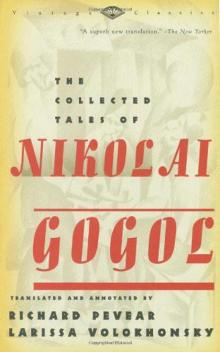 The Collected Tales of Nikolai Gogol
The Collected Tales of Nikolai Gogol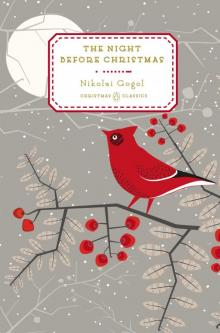 The Night Before Christmas
The Night Before Christmas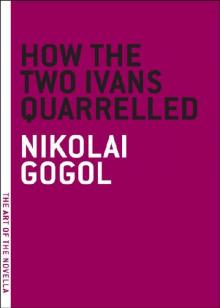 How the Two Ivans Quarrelled
How the Two Ivans Quarrelled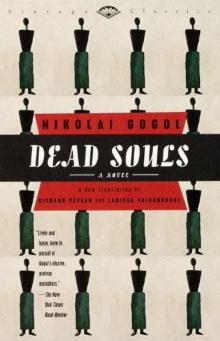 Dead Souls
Dead Souls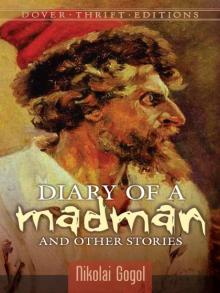 Diary of a Madman and Other Stories
Diary of a Madman and Other Stories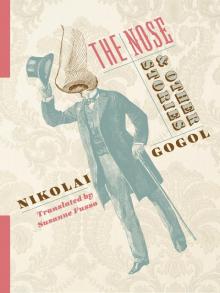 The Nose and Other Stories
The Nose and Other Stories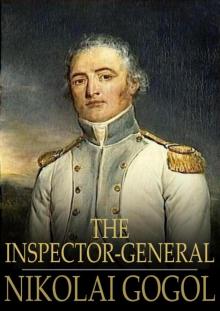 The Inspector-General
The Inspector-General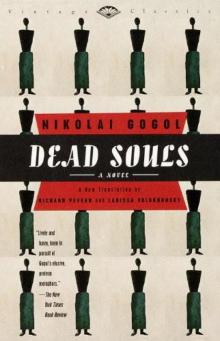 Dead Souls: A Novel
Dead Souls: A Novel